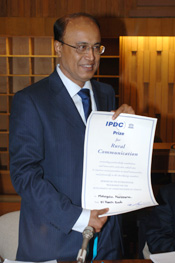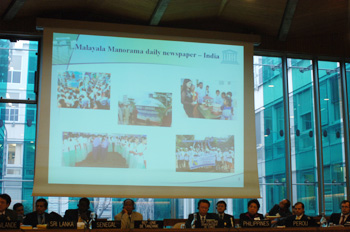IPDC to develop indicators to promote free and pluralistic media
24-03-2006 (Paris)

Malayala Manorama receiving the
IPDC-UNESCO Prize for
Rural Communication
© UNESCO
The Intergovernmental Council of UNESCO's International Programme for the Development of Communication (IPDC) will launch a broad consultation to develop indicators for media development.
The development of such indicators will enable media professionals, policy makers, development agencies, implementers and project proponents to analyze the various elements of a media system and to identify areas where support is essentially required.
The IPDC Council held its 25th session at UNESCO Headquarters from 21 to 23 March. The meeting provided an occasion for the representatives of the 39 Member States of the Council to discuss the activities of the Programme, assess its achievements, and appreciate the important reforms that the Programme has undergone in recent years.
The report evaluating these reforms, conducted by a team of researchers from the University of Oslo, was presented to the members of Council. Member States expressed their satisfaction with the results of the evaluation and praised the progress made by the IPDC, which according to the report, “has put a remarkable effort in implementing the reforms of working methods”. They also reiterated the crucial role played by the Programme in contributing to sustainable development, democracy and good governance through the strengthening of media capacities in the developing countries.
The 25th Council Session proved once again IPDC’s role as a forum for reflexion and discussion among Member States, experts and professional organizations. A thematic debate was organized in cooperation with UNESCO’s Information for All Programme (IFAP) on “Giving Voice to Local Communities: From Community Radio to Blogs”. Among the invited panellists were: Jo Tacchi, Senior Research Fellow at the Queensland University of Technology, Steve Buckley, President of the World Association of Community radio Broadcasters, Neville Alexander, Director of the Project for the Study of Alternative Education in South Africa (PRAESA), and Daniel Simmons, of Article 19.
As a follow-up to the World Summit on the Information Society (WSIS), the Council also hosted a debate focusing on the World Electronic Media Forum (WEMF), which was the most significant event held on media during the Summit. Rodney Pinder, Director of the International News Safety Institute (INSI), elaborated on the question of the safety of journalists and suggested using journalists’ safety as a possible indicator of media development. Jean Réveillon, Secretary General of the European Broadcasting Union, dealt more specifically with the outcomes of WEMF.
On the recommendation of the IPDC Bureau, the newly re-elected Chairperson of the Bureau, Torben Krogh, presented the 2005 IPDC-UNESCO Prize for Rural Communication to Malayala Manorama, a mainstream daily newspaper published in Kerala, India. The US$ 20,000 Prize was attributed in recognition of Malayala Manorama’s innovative communication campaign, “Pala Thulli”, aimed at raising awareness among the people of Kerala on the importance of water conservation as a solution to the problem of droughts in the region.
The Council session was widely attended by representatives of UNESCO Member States, NGOs and professional organizations. It followed the Meeting of the IPDC Bureau, which took place at the end of February, during which 41 new projects in developing countries received funding, for a total of over US$ 850,000.
The IPDC Council held its 25th session at UNESCO Headquarters from 21 to 23 March. The meeting provided an occasion for the representatives of the 39 Member States of the Council to discuss the activities of the Programme, assess its achievements, and appreciate the important reforms that the Programme has undergone in recent years.
The report evaluating these reforms, conducted by a team of researchers from the University of Oslo, was presented to the members of Council. Member States expressed their satisfaction with the results of the evaluation and praised the progress made by the IPDC, which according to the report, “has put a remarkable effort in implementing the reforms of working methods”. They also reiterated the crucial role played by the Programme in contributing to sustainable development, democracy and good governance through the strengthening of media capacities in the developing countries.
The 25th Council Session proved once again IPDC’s role as a forum for reflexion and discussion among Member States, experts and professional organizations. A thematic debate was organized in cooperation with UNESCO’s Information for All Programme (IFAP) on “Giving Voice to Local Communities: From Community Radio to Blogs”. Among the invited panellists were: Jo Tacchi, Senior Research Fellow at the Queensland University of Technology, Steve Buckley, President of the World Association of Community radio Broadcasters, Neville Alexander, Director of the Project for the Study of Alternative Education in South Africa (PRAESA), and Daniel Simmons, of Article 19.
As a follow-up to the World Summit on the Information Society (WSIS), the Council also hosted a debate focusing on the World Electronic Media Forum (WEMF), which was the most significant event held on media during the Summit. Rodney Pinder, Director of the International News Safety Institute (INSI), elaborated on the question of the safety of journalists and suggested using journalists’ safety as a possible indicator of media development. Jean Réveillon, Secretary General of the European Broadcasting Union, dealt more specifically with the outcomes of WEMF.
On the recommendation of the IPDC Bureau, the newly re-elected Chairperson of the Bureau, Torben Krogh, presented the 2005 IPDC-UNESCO Prize for Rural Communication to Malayala Manorama, a mainstream daily newspaper published in Kerala, India. The US$ 20,000 Prize was attributed in recognition of Malayala Manorama’s innovative communication campaign, “Pala Thulli”, aimed at raising awareness among the people of Kerala on the importance of water conservation as a solution to the problem of droughts in the region.
The Council session was widely attended by representatives of UNESCO Member States, NGOs and professional organizations. It followed the Meeting of the IPDC Bureau, which took place at the end of February, during which 41 new projects in developing countries received funding, for a total of over US$ 850,000.
 Malayala Manorama daily newspaper - India
Malayala Manorama daily newspaper - India© UNESCO
Related themes/countries
· UNESCO-IPDC Prize for Rural Communication
· Media Development: News Archives 2006
· IFAP: News Archives 2006
· News Archives: 2006
· News Archives 2006
Share this story:
Contact information
- UNESCO
Source














